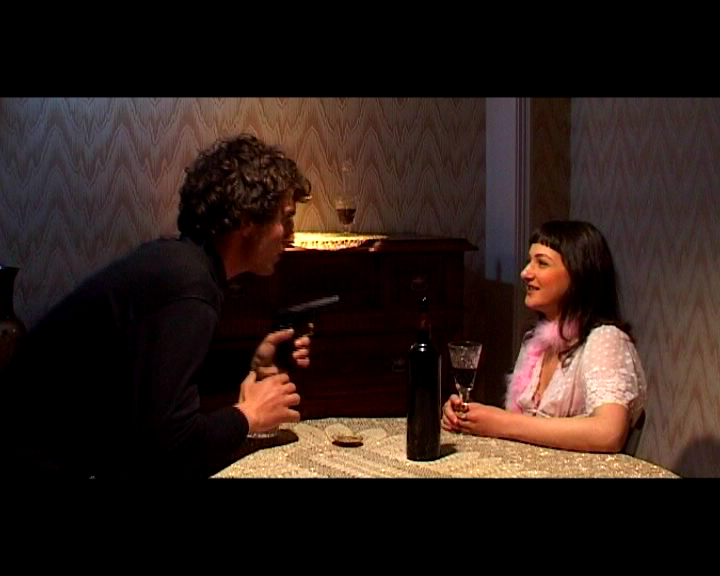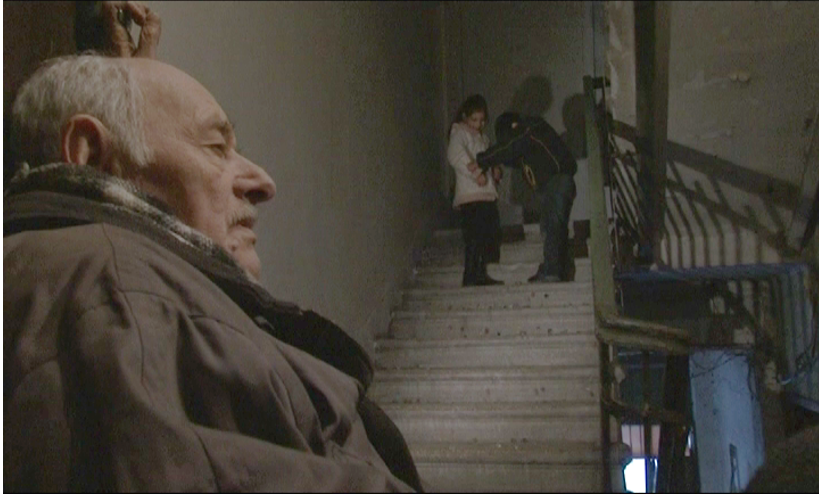There comes a moment in every person’s life when they lose the ability to face great hopelessness, disappointment, and setbacks. At such times, we make decisions that we are not proud of. Often we justify this by saying that we are in trouble, “that’s what life brings,” and so on. At some point, such a gap appears among people that it is difficult to recognize who is right. Is everything in the world divided into good and bad?
Gvantsa Sutidze’s student film, “The Murder” (2007), deals with the aforementioned human moment, which we will all encounter at least once in our lives. The action begins with a young boy breaking into an apartment with the intention of robbing it. He does not know that there is also a housewife in the house bathing. At a glance, when the viewer sees the robber, he is not really filled with empathy for him. In the next scene, we can see how he flings at the fruit and eats it. We can conclude from it how one simple, small scene can change our opinion about a character, or make us think more deeply. A sense of empathy awakens that we didn’t even remember having. There is also a very banal, yet memorable scene of parallel editing, when the housewife falls asleep in bed during the robbery.
The film’s running time is 15 minutes, and it can be safely said that almost the entire film is played with music in the background. It is not very pleasant for the ear and the eye at the same time when music plays non-stop, and adding more dialogue could even make the narrative better. There is not only foreign, but also Georgian music, the context of which is not very acceptable and understandable.
From the very beginning, it is expected that the woman and John (the name that the thief comes up with at that moment) will soon run into each other. When they meet, it is clear that the boy is much more nervous and makes us think that this is his first robbery. The author offers us very peculiar characters, whose dialogue is realistic, although predictable. The fact is that the thief does not want to make the woman feel afraid, he claims that he “has nothing to do with women,” that he might strangle her, and so on. She is afraid and shy at the same time. At this time, the character of the housewife, whose dress, hairstyle, behavior and phrases are very striking and memorable, uses a completely different method to deal with the thief. The lie that she will hire the man to work in the stable and the robber’s happy, childish reaction makes the viewer feel sadder. for her. This lie turns out to be decisive and completely changes the course of the film. The power passes into the woman’s hands.
It was an interesting move by the director to present in the film the moment that was actually happening in the character's mind. Moreover, this happened twice, and both times, we could say, believed it. We don't know which decision was better in either case, although the film gives us time and opportunity to think about it.
Introducing new characters, namely a woman and a man, who appear for no more than a minute and a half, was a rather risky decision. Often in short films, introducing a character for such a short time is not justified, although, in this case, it is clear that it was even necessary for the plot development. On the one hand, to better demonstrate the woman's material situation (she is so rich that she has servants), and on the other hand, for the finale.
The ending, which includes the sound of police sirens and the thief's shocked reaction, turned out to be very humorous and expected. At a glance, it was a clear example of the tactic of deception and the woman's beauty to seduce a man, based on simplicity and banal dialogues. The idea, which was addressed to the viewer, full of interpretation and positive feelings, turned out to be not so complicated.
Returning to the title, the question arises - why murder? The only murder scene in the film takes place in John's mind. This was, to some extent, a trick. The viewer expects something that does not actually happen and remains at the screen until the last minute, waiting for the end.
The dramaturgy of the film is well-constructed. In the time frame that was intended for the plot, it turned out to be enough to talk about the problem that is raised in front of him but how much was it enough for what is behind him? The remaining one refers to the head of the house mentioned by the robber, that is, the woman's husband. The robber says: "I have come to rob your old husband." This raises a logical question, whether the robber knew the man mentioned above. We are also interested what brought the robber to this point. The fact is that he is a very unstable person and it is very easy to persuade, verbally stop, and manipulate him. He calls the housewife a "city girl" and this indicates that Johnny is provincial. This and other details raise more logical, although unanswered questions about this character, and no one is there to answer them.
The film would probably have been better if the actors had played at a professional level or at least close to it, although they seemed to be clearly artificial. In fact, this is a film full of rather primitive dialogues, the main message of which is both topical and banal. Despite this, the topic that the director talks about in the film fits quite clearly into the framework that is called a short film.
Anna Maria Dardagani






